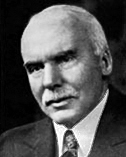Frank Lillie served as President of the National Academy of Sciences from 1935 to 1939. A pioneer in embryology, he discovered the mechanism of fertilization of an ovum and the role male hormones play in sex-determination. He also played an important role in turning the Woods Hole Marine Biological Laboratory into a leading research center.
After graduating from the University of Toronto in 1891, Lillie joined the faculty at the newly founded University of Chicago and received his PhD in zoology in 1894. He moved to the University of Michigan from 1894 to 1899 to teach zoology, but returned to the University of Chicago in 1900 to teach. In 1906 he became a Professor of Embryology, in 1910 he served as Chairman of the Department of Zoology, and from 1931 to 1935 he was the Dean of the Division of the Biological Sciences. He was the director of the Woods Hole Marine Biological Laboratory from 1908 to 1939 and was president from 1925 to 1942. In addition, he served as editor of The Biological Bulletin.
In 1935-36 Lillie served as both President of the National Academy of Sciences and the Chairman of the National Research Council. The Pilgrim Trust Lectureship was established in 1938 to foster an exchange of ideas with members of the Royal Society of London and the Academy. He acquired grants from the Rockefeller Foundation to integrate a program of fellowships in the natural sciences. During the remainder of his presidency he was appointed Chairman of the Oceanographic Committee, which proposed the funding and infrastructure necessary for the creation of the Oceanographic Institute.



